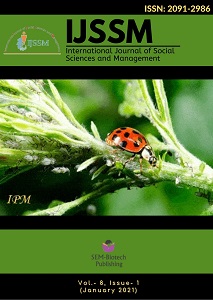Teachers' Questioning: A Survey of Nepali Schools
DOI:
https://doi.org/10.3126/ijssm.v8i1.34115Keywords:
Questions, Higher-Order, Lower-Order, Follow-Up, TeachersAbstract
This study intends to investigate the present situation of teachers' questioning in Nepali school, test the use of questions types, and analyze across the characteristics of the teachers. The data were collected from a survey of 92 teachers of 81 schools including both community and institutional schools. The questionnaire was prepared largely based on Introduction of Core Skills for Teachers (British Council, 2016). The Cronbach's alpha was in the range of 0.7 that ensured the reliability of the questionnaire. The descriptive statistics and inferential statistics were employed to find out the results. The results show that in overall study, as the effective teachers, Nepali school teachers use lower-order questions, higher-order and follow-up questions in a continuum of frequency from lower to higher order irrespective of teachers' selected characteristics. However, the teachers with a few years of experience use lower-order questions, and trained teachers use more frequently follow-up questions to a significant extent. Based on the findings of this study, Nepali school policy makers and leaders can adapt the existing teacher development programs and policies to make effective teaching and learning. Moreover, teachers can also get insights actually at what level they are in questioning techniques, and further, improve their questioning techniques.
Int. J. Soc. Sc. Manage. Vol. 8, Issue-1: 333-340
Downloads
Downloads
Published
How to Cite
Issue
Section
License
This license enables reusers to distribute, remix, adapt, and build upon the material in any medium or format for noncommercial purposes only, and only so long as attribution is given to the creator.




